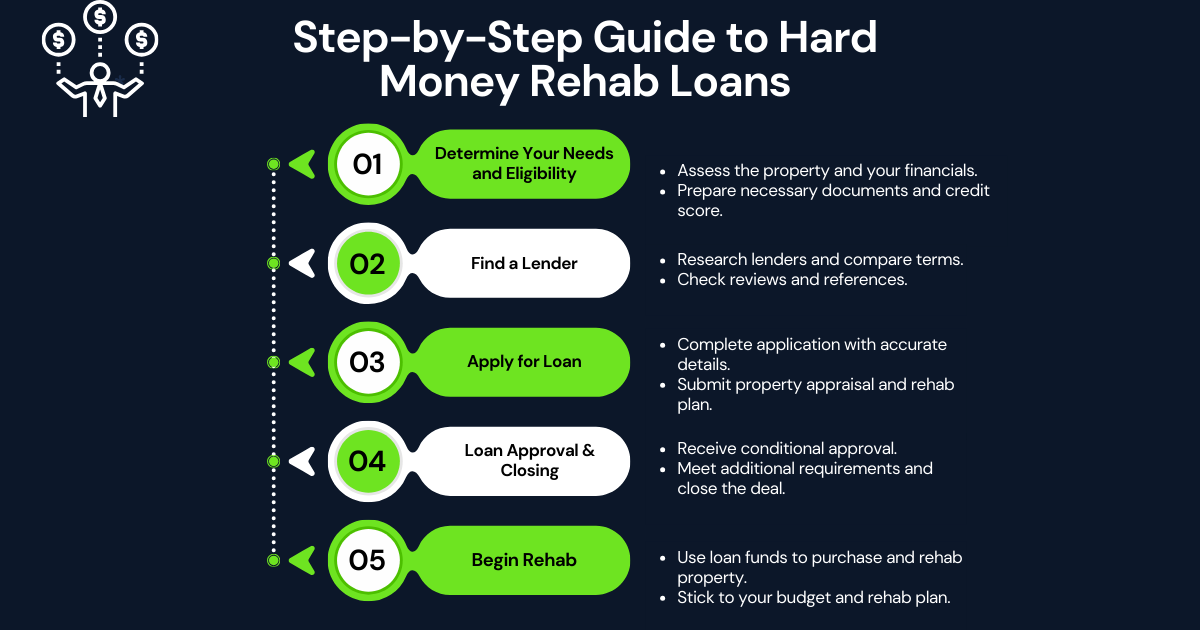Table of Contents
ToggleHard money rehab loans are gaining a share in the real estate market as they are a profitable source of funds for refurbishing and renovating distressed properties. One of the main benefits that is attracting investors is its flexible and quick financing feature.
As per the reports, states like San Francisco, Texas, and Florida in the US are noticing a large shift towards the hard money rehab lending market due to high-value properties, and the market is projected to grow at an annual CAGR of 5-7% by 2025, making it the viable option for maximizing return on investment in the coming years.
In this blog, we will understand the concept of a hard money rehab loan, its types, key features, and how you can ease out the complex process by opting for the right rehab lender..
Overview of Hard Money Rehab Loans
Hard money rehab loans are short-term loans offered at higher interest rates, supporting fast financing and asset-based security. In contrast to traditional loans, which frequently place an importance on the borrower’s credit history, hard money rehab lenders frequently consider the investment’s current value as well as its potential for profitability.
Types of Hard Money Rehab Loans: Quick Overview
Hard money rehab lenders provide different types of hard money rehab loans to real estate investors based on their specific needs and demands. Let us have a closer look at the different types of hard money rehab loans that are available.
- Fix and Flip Loans: These loans are short-term and quickly funded in nature, often provided to such investors who make a profit out of the renovation of distressed properties, which includes acquisition price and renovation costs.
1. Residential and Commercial Hard Money Loans: The nature of the property determines the type of loan to be taken by investors. For example, single-family/multi-unit dwellings for residential use and retail spaces/office buildings for commercial activities - Construction Loans: The usage of hard money construction rehab loans is for large-scale rehab projects and new construction. The disbursement of funds is done in a phased manner as per the project timeline.
- Rental Rehab Loans: Real estate investors who are interested in benefits in rental properties by acquiring and renovating them can opt for rental rehab loans. The investors can increase their rentals in the market after renovation. These types of hard money rehab loans provide quick and flexible funding but with higher interest rates.
- Bridge Loans: These loans are given to those investors who need short-term funding to cover the gap between acquiring a new property and selling an old one.
Key Features of Hard Money Rehab Loans
- Asset-Based Funding: Hard money rehab loans are secured by the property itself, which serves as the primary collateral, ignoring the prerequisite of maintaining a sound credit profile. This serves as a boon for borrowers with a low credit score.
- Brief Duration: Hard Money loan rehabs are usually of shorter duration, varying from six months to three years.
- Flexible Terms: As per the borrower’s financial position and projects, lenders offer flexible terms, including flexible repayment schedules, so the monthly cost can be saved
- Higher Rate of Interest: Hard money rehab loans involve increased hard money lenders’s risk due to higher costs and risks, which is reflected by charging higher interest rates, which fall between 9.5% to 14%.
- Quick Approval and Funding: One of the key benefits of these loans is the swift disbursement of funds, which enables the investor to enjoy a competitive edge to seize investment possibilities promptly.
How to Choose the Right Hard Money Rehab Lender?
- Reputation: Investors must seek hard money lenders with a solid reputation and a clean track record with positive online reviews shared by previous investors. A seasoned investor will be able to execute a seamless borrowing experience as they will be able to meet the specific needs of rehab projects.
- Interest Rates and Fees: Hard money rehab loans are generally offered at higher interest with various fees such as appraisal, origination fees, closing fees, and more. Borrowers must compare different hard money lenders to receive a competitive rate and understand all the costs associated with the loans.
- Additional Support: Investors should search for hard money lenders who engage in active and quick responses along with consistent and clear communication, resulting in minimal misunderstandings regarding the loan process.
- Loan Terms: Hard money rehab lenders prefer a loan-to-value ratio between 60% to 75% and a repayment structure between 6 months to 3 years. To save the interest cost, borrowers should understand the LTV ratio, repayment schedule, early repayment, and any prepayment penalties with the lender.


Discovering the market of hard money rehab loans, how these loans work, their terms, application processes, and how to execute successful rehab projects to boost your real estate investment portfolio
Conclusion
Hard money rehab loans have become a great avenue for borrowers who are in search of quick and flexible funding, especially for distressed properties. Traditional financing has taken a backseat due to its rigid approach and extended processing time, which has boosted the demand for hard money loan rehab and is still going strong, despite the difficulties emerging from higher interest rates, affordability, and the complex process of searching for a genuine hard money lender. Munshi Capital as a hard money lender can help streamline your loan application by providing adequate guidance and assistance to pursue rehab projects and generate profitable results.
Read more: Pros and Cons of Hard Money Rehab Loans
Frequently Asked Questions:
- What is the maximum offered by a hard money rehab lender?
The loan amount depends on factors like the property’s present value, estimated after-repair value, and set of requirements by a lender such as LTV ratio, borrower’s experience, loan to cost ratio, and more.
- Can traditional loans be used to fund hard money rehab loans?
Yes, many investors opt for this switch to benefit from the longer repayment period and lower interest rates that are not provided in hard money rehab loans.
- What if I fail to repay the hard money rehab loan on time?
Defaults in repayment of hard money loans attract hefty penalties, higher interest rates, or foreclosure. Certain hard money rehab loan lenders may offer refinancing and extensions to prevent such inconvenience.





